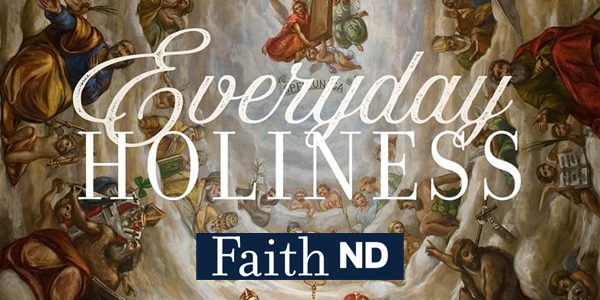Neuroscience and (Your) Behavior – What is neuroscience, and why are relationships so important?
Subscribe to the ThinkND podcast on Apple, Spotify, or Google.
Featured Speakers:
- Connie Snyder Mick, Director of academic affairs and Director, Poverty Studies Interdisciplinary Minor, A&L University of Notre Dame
- Nancy Michael, Associate Teaching Professor and Director of Undergraduate Studies for Neuroscience and Behavior, Science University of Notre Dame
The first virtual event of the Neuroscience and (your) Behavior series featured a discussion on how scientific understanding of one’s own and others’ brains can foster development, solidarity, and the principles of Catholic social teaching in communities. The event was led by Nancy Michael, Neuroscience and Behavior Associate Teaching Professor and Director of Undergraduate Studies, with special guests Connie Snyder Mick, Center for Social Concerns Senior Associate Director and Director of Academic Affairs, and Arafat Aliyi, Notre Dame Class of 2023. The speakers shared how their own experiences with interdisciplinary collaboration and service enhanced both their intellectual and spiritual pursuits.
After introducing the work done by the Department of Neuroscience and Behavior and Center for Social Concerns (CSC), Michael and Mick showed how collaboration between their areas of expertise can help them better engage with disadvantaged communities. Mick explained that as the CSC partners with a number of different organizations on campus, neuroscientists give them more precise language to discuss the vulnerabilities that people face and how to heal these problems. In turn, Michael conveyed how the community-based learning strategies employed by the CSC enhance both neuroscience students’ and professors’ sense of mission in their discipline. Aliyi then described how the summer and winter session service learning projects she completed last year have helped her put the neuroscience knowledge she gained in the classroom into practice, as she helped children cope with the adverse developmental and social effects of the COVID-19 pandemic.
Just as interdisciplinary collaboration promotes better understanding of both science and service, Aliyi’s experiences illustrated how interpersonal interactions are neurologically necessary for one’s sense of self. These relationships form an especially essential part of children’s development, as the people around them shape their expectations. Michael explained how young people’s brains are particularly neuroplastic, meaning that they create associations and connections more easily. Thus, they are vulnerable to adverse childhood experiences and must rely on the people around them to develop buffering strategies and mitigate these psychological injuries’ negative effects. However, this importance of relationships does not disappear as one ages. Michael and Aliyi argued that society must think of growing older not as increasing independence but rather a transition from dependence to interdependence, with a continued focus on learning from and growing with each other.
Interpersonal relationships do not just help humans develop individually, but they also foster solidarity, giving people the knowledge and empathy to assist each other in times of need. While the pandemic has further highlighted the disparities in society and the human need for connection, Michael, Mick, and Aliyi have come together virtually with ThinkND to show how neuroscience and service can together create positive change.
- Spirituality need not conflict with science but can instead provide a reason for investigating the brain and human connections (5:25)
- Empathy and experience are essential to both helping people and studying neuroscience (27:25)
- Interdisciplinary collaboration benefits both community service and the study of neuroscience (30:09)
- Interpersonal relationships are essential to the development of both children and adults (35:57)
- “The more I learn about Catholic social tradition and really get to experience just incredible people of such deep faith, it really is astounding to me how much neurobiological mechanisms support all of the compassionate service perspectives of so many faith traditions and just morality in general” (Nancy Michael, 5:25)
- “Having a scientific lexicon to talk about and understand what you’ve been through personally is incredibly helpful, and doing that also builds your own capacity for empathy and understanding the challenges that others face” (Connie Snyder Mick, 8:07)
- “I think that’s one of the unique things about Notre Dame, that we can bring our whole selves to our teaching and to our research and that makes it stronger and more compassionate and empathetic in the long run” (Connie Snyder Mick, 8:31)
- “The Center for Social Concerns allows us to do neuroscience differently here. The idea of community-based learning and community-engaged research that the CSC does so well has really become a bedrock of what makes our program so special” (Nancy Michael, 15:22)
- “Being able to have a solid understanding of who you are allows you to flourish within a community.” (Arafat Aliyi, 18:48)
- “Being able to incorporate my knowledge of neuroscience and comparing that to how children look at their view of the self is something that I found astonishing and has actually influenced me to participate in another Service Learning Project, seeing how…communication and development of children has been severely impacted by COVID-19” (Arafat Aliyi, 19:27)
- “From a developmental perspective…it’s critically important to understand that the brain actually has expectations from the environment, and [those] are not only central to a child’s sense of safety and well-being but also form the constructs of worth and efficacy.” (Nancy Michael, 22:26)
- “Buffers are those human and material resources that help protect and heal. And the Center [for Social Concerns] has always been about that. We don’t want to just address a problem, we want to build healing and protection into the system” (Connie Snyder Mick, 25:04)
- “Poverty studies is not about studying poverty. It’s about experiencing. It’s about how we can reattribute social bias, how we can redistribute resources, how we can walk and witness to really understand” (Nancy Michael, 28:05)
- “Being told that you should be functioning on your own takes away that idea that humans are social beings…We do not become good people on our own. We look at good people, we see how they have a positive [influence] on the community, and we desire to be like them.” (Arafat Aliyi, 37:56)
Related Content
Shannon Sharpe/Katt Williams, The Black Impact on the NFL Super Bowl & Taraji P Henson
In the first episode for Season 8, Isaiah and Tykiera talk about the Shannon Sharpe/Katt Williams Interview that took the internet by storm at the beginning of the year as well as...
watch videoEveryday Holiness: John Cavadini
Dr. John Cavadini, director of the McGrath Institute for Church Life and professor in the theology department at the University of Notre Dame, shares some of the hidden aspects...
View EventClimate Change and The Limits of Narrative
Join the Kellogg Institute for the introductory session of a workshop refining Kellogg Faculty Fellow Roy Scranton’s draft book project “Ethical Pessimism: Climate Change and...
View Event


